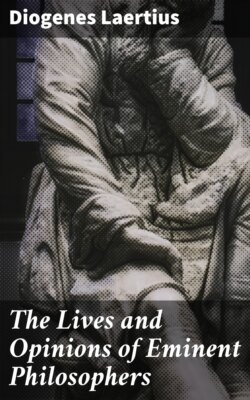Читать книгу The Lives and Opinions of Eminent Philosophers - Diogenes Laertius - Страница 46
На сайте Литреса книга снята с продажи.
LIFE OF ÆSCHINES.
ОглавлениеTable of Contents
I. Æschines was the son of Charinus, the sausage-maker, but, as some writers say, of Lysanias; he was a citizen of Athens, of an industrious disposition from his boyhood upwards, on which account he never quitted Socrates.
II. And this induced Socrates to say, the only one who knows how to pay us proper respect is the son of the sausage-seller. Idomeneus asserts, that it was he who, in the prison, tried to persuade Socrates to make his escape, and not Crito. But that Plato, as he was rather inclined to favour Aristippus, attributed his advice to Crito.
III. And Æschines was calumniated on more than one occasion; and especially by Menedemus of Eretria, who states that he appropriated many dialogues of Socrates as his own, having procured them from Xanthippe. And those of them which are called “headless,” are exceedingly slovenly performances, showing nothing of the energy of Socrates. And Pisistratus, of Ephesus, used to say, that they were not the work of Æschines. There are seven of them, and most of them are stated by Persæus to be the work of Pasiphon, of Eretria, and to have been inserted by him among the works of Æschines. And he plagiarised from the Little Cyrus, and the Lesser Hercules, of Antisthenes, and from the Alcibiades, and from the Dialogues of the other philosophers. The Dialogues then of Æschines, which profess to give an idea of the system of Socrates are, as I have said, seven in number. First of all, the Miltiades, which is rather weak; the Callias, the Axiochus, the Aspasia, the Alcibiades, the Telauges, and the Rhino. And they say that he, being in want, went to Sicily, to Dionysius, and was looked down upon by Plato, but supported by Aristippus, and that he gave Dionysius some of his dialogues, and received presents for them.
IV. After that he came to Athens, and there he did not venture to practise the trade of a sophist, as Plato and Aristippus were in high reputation there. But he gave lectures for money, and wrote speeches to be delivered in the courts of law for persons under prosecution. On which account, Timon said of him, “The speeches of Æschines which do not convince any one.” And they say that when he was in great straights through poverty, Socrates advised him to borrow of himself, by deducting some part of his expenditure in his food.
V. And even Aristippus suspected the genuineness of some of his Dialogues; accordingly, they say that when he was reciting some of them at Megara, he ridiculed him, and said to him, “Oh! you thief; where did you get that?”
VI. And Polycritus, of Menda, in the first book of his History of Dionysius, says that he lived with the tyrant till he was deposed, and till the return of Dion to Syracuse; and he says that Carcinus, the tragedian, was also with him. And here is extant a letter of Æschines addressed to Dionysius.
VII. But he was a man well versed in rhetorical art, as is plain from the defence of his father Phæax, the general; and from the works which he wrote in especial imitation of Gorgias of Leontini. And Lysias wrote an oration against him entitling it, On Sycophancy; from all which circumstances it is plain that he was a skilful orator. And one man is spoken of as his especial friend, Aristotle, who was surnamed The Table.
VIII. Now Panætius thinks that the Dialogues of the following disciples of the Socratic school are all genuine—Plato, Xenophon, Antisthenes, and Æschines; but he doubts about those which go under the names of Phædon, and Euclides; and he utterly repudiates all the others.
IX. And there were eight men of the name of Æschines. The first, this philosopher of ours; the second was a man who wrote a treatise on Oratorical Art; the third was the orator who spoke against Demosthenes; the fourth was an Arcadian, a disciple of Isocrates; the fifth was a citizen of Mitylene, whom they used to call the Scourge of the Orators; the sixth was a Neapolitan, a philosopher of the Academy, a disciple and favourite of Melanthius, of Rhode; the seventh was a Milesian, a political writer; the eighth was a statuary.
